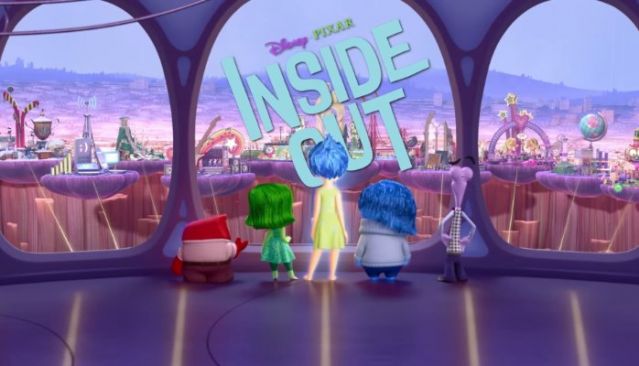
Career
What Pixar’s 'Inside Out' Tells Us About How We Work
How do parents set their kids up for success?
Posted July 16, 2015

Pixar’s new movie Inside Out explains the vital role we have as parents and educators in setting our kids up for success in their lives—and their future careers. The memories and emotions our kids experience and how we help them store these thoughts and feelings develop their orientation towards work. This orientation is directly linked to everything from their their performance in their future jobs to their expected lifespan.
In Pixar’s Inside Out, we get a tour of the mind in a visualization of how our personalities are formed and change based on specific memories and emotions.
The protagonist, whose mind we explore in the movie, is 11-year-old Riley. Inside her head are anthropomorphized characters who represent her five emotions: Joy, Fear, Disgust, Anger and Sadness.
We see Riley’s personality formed throughout her childhood. Important events combine with emotions to form her personality traits, which are visualized as personality islands. At the age of 11, Riley’s personality islands range from Friendship to Goofball to Family.

Riley's "Family Personality Island" from Pixar's Inside Out
As Riley grows up, she’ll add new personality islands. At some point in her adolescence she will form a personality island based on her work and career. Groundbreaking research out of the University of Michigan gives us a glimpse of what this “work personality” island might look like if we were to follow Riley into adulthood.
While everyone’s islands are unique and specific to their own emotions and experiences, how we approach our work tends to fit into three major themes—three major islands.
Making Money Island
Littered with timesheets, Facebook feed checks, and clocks counting down to 5pm, Making Money Island is built on endless rows of cubicles and it has a “boss” hovering over it. In front of it is a giant TGIF sign. It is the work personality island that forms when you believe work is something only to do to make money and that employers see you only as a resources to be used up. There is little to no Joy on this island.
Achievement Island
Achievement Island is filled with award ribbons, high fives, PowerPoint presentations and speaker podiums. In the middle is a corporate ladder to climb, and climb and climb. You understand work to be a game with winners and losers, with the goal of looking impressive to others. Joy sometimes makes an appearance but it’s much easier for Anger, Sadness, and Disgust to dominate.
Purpose Island
Purpose Island has a diverse ecosystem filled with all sorts of activities and people. There are mentors to guide you and opportunities for creativity and stepping out of your comfort zone to grow professionally. Work isn’t defined by the 9 to 5 job or title, but by the activities that make you feel like you’re connected, effective, and growing. Since the island holds so much, everything has its place, allowing Joy to permeate the experience, even in the midst of other emotions.
As we develop our work personality island, we take in new experiences that reinforce our view of work and add them to the island to strengthen it in our minds. Just as Riley’s story teaches us, once these islands form it takes a big event for them to fall away and reform. Emotions and memories that don’t fit the theme of the island are discarded.
This dominance of certain memories and emotions is why someone with a Making Money island will remember every example of when they were dismissed or frustrated at work. If they do get to do something meaningful, it isn’t enough to impact their work personality.
University of Michigan's Amy Wrzesniewski and her colleagues found that people who have a Purpose work personality island have higher job and life satisfaction than people with the other work islands have. They also tend to be more successful and higher performers, in large part because they are more loyal and better collaborators.
Help Children Build Purpose Islands
As parents and educators, we need to play a more intentional role in helping children develop a work personality island that will set them up for a long life and amazing career.
Here are four ways you can help the children in your life form a Purpose island:
1) Describe Your Island
If you are reading this and motivated to help children build a Purpose work personality island, you probably have one yourself. Talk to them about it and share how you built your work island.
Reflect: When did you create your work personality island? How would you describe it? Which memories and emotions are connected to the island? What role did your parents and others play in its creation?
2) Let Them On Your Island
It is powerful for children to see you at work and experience the role of work in your life. Invite children into your workplace and show them why you care about your work and your colleagues. Make it real.
Reflect: Who are the people at your work who are important to you? When do you feel you make an impact on the lives of others? How does work help you grow?
3) Help Them Build Their Island
Every day children are creating new memories and associating them with emotions that build personality islands. As they begin to participate in work-like activities (chores, lemonade stands), engage with people who are working (their teachers, your barista), or listen to you talk about work, help them channel their memories and emotions to build a positive work personality island.
4) Help them See Complexity of Emotions at Work
You won’t always come home from work glowing. You will have hard days and failures. Help kids understand that meaning at work comes from being invested and caring. With that comes every kind of emotion and that is part of what makes it wonderful and rewarding.
Design Your Purpose Island
Purpose Island doesn’t look the same for everyone. Our research has identified 24 different designs for Purpose Island to fit the diversity of ways we gain purpose from our work. Visit Imperative to discover what bring purpose to your work to help guide your career and help share it with the kids in your life.
Imperative is an advocate for purpose-driven people in the workforce. We offer individuals the first-ever online psychological assessment to uncover what brings them purpose in their work. We also work with employers to assess their effectiveness in hiring and empowering purpose-driven employees. Click here to take it (it's free!).
Aaron Hurst is CEO of Imperative. He is also the founder of the Taproot Foundation and author of The Purpose Economy. Follow him on Twitter: @Aaron_Hurst.



